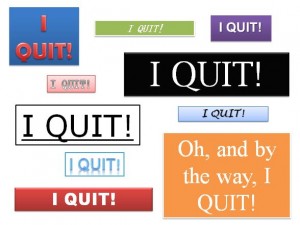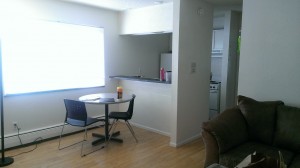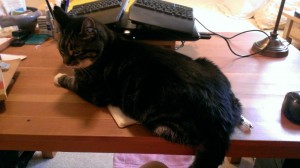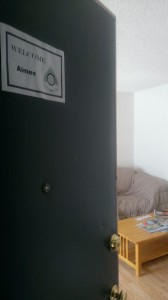Quitting
Employee Stress vs. Entrepreneur Stress
I had stress when I worked a full-time corporate job. I have stress now. What’s the difference?
Corporate stress came from unrealistic workloads, office politics and being asked to participate in business decisions that I disagreed with. Working in a stressful environment is like breathing in low levels of poisonous air every day. It won’t kill you all at once. It is a long, slow decline.
Entrepreneur stress is completely different. It is the flip side of the positives parts of working on my own. It comes from the pressure I put on myself to spend more time on my projects. It’s learning Quickbooks and all kinds of marketing and operational tasks that I used to have corporate resources to help me execute. It’s the uncertainty of not having a scripted career path.
This kind of stress is much easier to live with. I can decide how many hours to spend on my business and writing projects. I can outsource tasks that aren’t my strong points and that I don’t enjoy doing. I can tame my thoughts when I worry.
All stress is not created equal.
Multiplying by Zero
 Years ago I was working for a company that I cared about enormously. I was loyal and worked hard and really wanted to be there. But during the last year or so of my employment, things got weird.
Years ago I was working for a company that I cared about enormously. I was loyal and worked hard and really wanted to be there. But during the last year or so of my employment, things got weird.
I would do something very well and it would be ignored. For example, the company used logos that were different sizes and fonts. I changed them to be consistent and not only did it look better, but it eliminated an entire set of decals that were being printed and stored, which saved about $5,000 every month. The reaction was somewhere between a yawn and a blank stare.
Another time I was chastised for not going out to dinner with a group of salespeople the night before a customer event. I skipped the dinner because I was at the office making final preparations late into the night. I prioritized making sure details were in place for a successful event. They prioritized the social aspect of having an evening out with their coworkers. I was told that it seemed like I wasn’t a team player. Huh? The event went well, anyway.
This stuff was so strange to me. I liked most of the people that I worked with and it was confusing to have people that I cared about say and do things that just didn’t make sense.
I will never forget the advice I got during a graduate school leadership class. I was explaining the situation to one of my classmates and he said that he had a job that was like that once. I asked him how he resolved the problem. His answer was “I quit and got a job somewhere else.”
That statement shifted my thinking. I had put all of my energy into trying to understand the situation and fix it because I truly wanted it to work out. I started to realize that no matter how much I wanted it to get better and despite believing that my work benefited the company, I was only part of the equation. Maybe that seems obvious to other people, but until then I kept thinking that if only I could figure out what to say or do, the people around me would act more rationally.
Not long after the conversation with my classmate, one of the vice presidents at the company bought everyone a copy of the book Who Moved My Cheese by Dr. Spencer Johnson. It’s a parable that basically says, “If you’re no longer getting what you need in your current environment, go get it somewhere else.” The minute I put down the book I picked up the phone and called a staffing company. I made the call on a Monday and on Friday I interviewed for a consulting contract. I was hired the next Monday. Eight months after that I took a full time position and spent another twelve years working there.
Most of my thirteen years there were great. The last few were not. Again, I had years invested in the company and there were enough good things about it that I kept looking for jobs on other teams and waiting for the next reorganization to see if it would make things better. None of that worked. I came up with my own analogy: it was like multiplying by zero. It didn’t matter how many hours I worked or what impact my programs had on the business. Everything that I did was cancelled out because where it intersected with the organization was like multiplying by zero. The end result is always the same. Zero.
One year ago today I quit that company. Now my happiness is multiplied each time I find projects that align with my values: working with people I respect, flexibility to work at home, the ability to make an impact through my projects and fair pay.
It isn’t always easy on my own, but the math makes sense.
Opting Out or Opting In?
A few months ago someone asked me if the change I made in my career was opting out of something or opting in.
Great question. The answer is both.
I opted out of a work environment that no longer fit me. I said no to long, exhausting hours spent on tasks that were required for my role but that I didn’t believe in. I said goodbye to a false sense of security that comes with a company job. I left work that I enjoyed because the price I paid for doing that work wasn’t worth it anymore.
I opted in to choosing work that supports the kind of life I want to live. I said yes to deciding how to spend my time and energy. I said hello to feeling both uncertain and exhilarated about the possibilities for my future. I began writing and consulting work which isn’t always fun but is worth every moment.
Sometimes it is about saying no in order to say yes.
The Value of Less
One of my favorite things about the time I spent in Boulder at the Jack Kerouac School was living in my simple student apartment.
From the moment I walked in the door, I loved it. Even though it was a small one bedroom apartment it felt spacious and airy because there was hardly anything in it. It took me thirty minutes to put away all the belongings I brought with me. Another thirty minutes to rearrange my bed and desk.
Without stuff, life is simpler.
I had one suitcase worth of clothes, my computer, notebooks and not much else. The apartment came with a sofa, table, chairs, bed, desk and a few pieces of cookware and utensils in the kitchen. No microwave. No extra stuff – just the basics to live day to day.
It didn’t take long to decide what to wear because there wasn’t a lot to choose from. Which of my three tank tops to wear with jeans? Or which of my four dresses to pull on? If I was going to school, I wore my sandels. If I was walking anywhere else, sneakers.
I got so much writing done sitting at the desk in my bedroom. The walls were blank, so all of the ideas came from my head. No visual stimulation to distract me.
Returning home after living so sparingly was a shock. I felt like my house was screaming at me. Everywhere I looked there was stuff.
I decided to get rid of half of everything I owned. Much of what I had didn’t make sense for my new life. They were artifacts of the old life that I left behind when I quit my job and went out on my own. I didn’t want the clothes that I used to wear to work hanging up in my closet. I didn’t want boxes of computer equipment clogging up my bookshelf. I wanted blank space.
It was a good goal, but getting rid of half of everything I owned turned out to be more ambitious than what I was prepared to part with. After carloads of donations dropped off at the Goodwill, I hadn’t given away a even quarter of what I owned, and there were things that I wasn’t ready to part with. I wasn’t ready to give away the furniture that I inherited after my grandparents passed away. I didn’t want to get rid of Christmas decorations, cheese knives or nail polish. Even though I rarely use those things, the last thing I intended was to get rid of something only to repurchase it when I wanted it later.
I changed my goal to creating an empty drawer or shelf in every room of the house. That was doable.
I love these pockets of blank space. Especially around my desk, where I work. The less stuff I have in my line of sight, the more ideas make it out of my head and onto my PC.
I still have more stuff than I need or want. But I have much more breathing room.
Finding Your Passion is Overrated
![]() The whole “finding your passion” blitz is getting on my nerves. There’s an onslaught of books, classes, blogs and life coaches all telling us that there is a specific reason we’re on this Earth and we should be spending time and money figuring out what that is. In fact, if we’re not able to articulate our life’s passion in a mission statement format there’s something lacking in our lives and we’ll never be happy until we figure out what it is.
The whole “finding your passion” blitz is getting on my nerves. There’s an onslaught of books, classes, blogs and life coaches all telling us that there is a specific reason we’re on this Earth and we should be spending time and money figuring out what that is. In fact, if we’re not able to articulate our life’s passion in a mission statement format there’s something lacking in our lives and we’ll never be happy until we figure out what it is.
I met a life coach at a networking event a few weeks ago who seemed annoyed when I shared my thoughts on this topic. She informed me that her job was to help people find their passion whether it was their work or a hobby. “If you talk to someone long enough, you eventually find what lights them up,” she said.
OK, well that’s great if some people need helping figuring out what they’re interested in at $90 an hour. But I don’t need a coach to know that I light up talking about animal welfare issues. I’ll talk to you for a half-hour about what makes a good or bad sanctuary and then I want to stop talking about it and go on with my day. I like to visit sanctuaries and donate money to them and sign online petitions but I’m not compelled to do anything else about it. Maybe someday. Or maybe not.
When I conducted interviews for my book, I met people who are living their passion after quitting their corporate jobs. One woman’s most important hobby was scuba diving. She bought into an existing scuba business and now spends her work and leisure time on her favorite activity. I love those stories and think people who have a clear conviction about what they want to do with their time are fortunate to have a singular focus.
But I’d like to reassure the rest of us that there’s nothing wrong with our lives if we don’t have a specific calling. Maybe it’s more important to be happy, satisfied and at peace with our daily lives.
Don’t get me wrong, I’ve been an avid consumer of the “find your passion” type of book and class and coaching for years. Life coaches are a great resource for gaining clarity and taking action to increase satisfaction with our lives and I think that is more important than pursuing a validation for your life that you might never find.
Coaches are also helpful to overcome blocks. My sister, Kristen Sutich, is gifted at coaching me to feel at peace during difficult times and helps me make plans that sustain my goals. (She specializes in grief issues and helping moms send their kids to kindergarten, but I recommend her for general life coaching, too.)
I also took a tele-class this fall called “Find Your Calling Now”. It was led by Martha Beck who is my author-idol and whose books have inspired me for years. In the class, Beck talked about the Hero’s Journey, which the geeky writer in me loved, but in the end, I was nowhere closer to finding my life’s calling than before.
During the time period when I took the class, I was writing my book, working on a small startup company and spending a LOT of time wondering what the hell I was doing with my life. Even though I believed in the value of my projects and still do, they are not my life’s burning passion. I don’t jump out of bed at 5AM every morning because I’m filled with excitement to revise my book. My book is important to me but it isn’t magic. It takes energy and focus and discipline to work on it. It is similar with the startup business. The business model is compelling, but it doesn’t drive me.
At the present, I’m the happiest I’ve ever been with my work life. My main consulting gig provides interesting work that pays the bills, my clients are nice and I work from my home office. The freedom of doing my work in my own space is a huge part of my happiness. I make a healthy breakfast and lunch every day and can take a break to go for a walk from my own front door. I drive to the office for meetings and make a point of checking in with people when I’m there instead of taking for granted that I’ll see them each day. This arrangement also gives me the time and energy to work on my other projects outside of business hours.
 It took trial and error to get to this point. In some ways, my life resembles the one I had a year ago. I’m doing marketing for the same company that I left last June. I’m even in the same office complex – how weird is that?! But now I’m billing my hours from my home office as the owner of my own consulting company and that is a world of difference.
It took trial and error to get to this point. In some ways, my life resembles the one I had a year ago. I’m doing marketing for the same company that I left last June. I’m even in the same office complex – how weird is that?! But now I’m billing my hours from my home office as the owner of my own consulting company and that is a world of difference.
It is a satisfying feeling to look back at the week with gratitude because every day was a great day. Am I living my life’s passion? No. But I’m deeply happy. And that’s more than enough for me.
How to Cope While Plotting to Escape Your Job
I’ve done a lot of research for the book I’m writing about people leaving their jobs to pursue more meaningful work. One of the most interesting things I learned was the various ways that people coped with their unpleasant work situations while they prepared to quit. Here are some of the top coping strategies I heard about:
On your drive into the office each morning, turn up the volume on your car stereo and blast any song that you can yell-sing along with. Repeat on your drive home.
Watch the 1975 movie “Rollerball”. In it, corporations rule the word instead of countries and individualism is squashed by the puppet masters. Marvel that the film is set in 2018.
Join a support group. AA, a church group, a Non-Violent Communications practice group. Anywhere where you are with trusted people that you can talk honestly about your situation. Or go to a counselor. Paying someone $100 to listen to you for an hour might be the best money you’re spending.
Change the settings on your smart phone so that your work email doesn’t automatically sync. Then make a point of not checking it after you’ve left work in the evening and not until you arrive at work the next day. And never on weekends. They have your cell phone number, right? If it is an emergency, they can call you.
Move the icon or tile for your work email to the very bottom of your smart phone, so you can’t see it unless you scroll down or navigate to another page. Psychologically this is a reminder that your workplace isn’t the most important part of your life. Put the higher priority icons or tiles at the top – your contacts, your calendar, your camera and pictures – you look at your phone multiple times a day so let it reinforce your values.
Put yourself first. Running late in the morning? Eat breakfast anyway. It’s your health and your energy. Feeling fatigued at the office? Take ten minutes to visit with a coworker or take a walk around your building. Don’t work at your desk during lunch unless you’re planning to leave work early to compensate. Go sit in the cafeteria and clear your head, go run an errand, or take a nap in your car.
Download a countdown app to your phone and set it for the day that you plan to give notice. Give the countdown a funny name that won’t tip off anyone at the office if they happen to see it. Like “lunch with Michael Scott” (a reference to the head Dunder Mifflin’s Scranton branch from the former tv series “The Office”). Or “Dilbert Festival”. Or “Day of Reckoning”. Every time you feel like screaming at your desk, take out your phone and look at your countdown.
Start taking home the things you care about from your office. Replace them with things you don’t care about, or facsimiles of what was there before. Like my friend who took home the photo he had on his wall but replaced it with a color photo copy.
At home, take an old cardboard box and write “This is the box I’m going to use to carry my stuff home from the office” on the inside with a black sharpie. Put it in your closet or the trunk of your car.
Then every day when you go into the office, smile at your subversive self.
It’s Not Just Time. It’s Also Energy.
I hear this all the time and you probably do, too: “I don’t have time.” It’s often the first response or excuse we think of when we don’t want to do something or think it isn’t possible.
I grew up writing stories and poems. I enjoyed it. I majored in English in college and when I wasn’t writing essays or creative pieces for school assignments, I would also write for myself. That practice continued long after I graduated. I had notebooks and PC word docs filled with stories and ideas that I created in the evenings after work or on weekends.
But as years went by I began working longer, more stressful hours at my job and writing for fun slowed down. And then stopped. I didn’t write for eight years.
Certainly the more hours I spent working meant fewer hours left for myself, but what was worse than the lack of time was the lack of energy. I was tired in every sense: physically, mentally, emotionally, and spiritually. My free time became about recovery, not about hobbies, having fun, and spending time with people. I needed a lot of sleep just to be able to get back up the next day or the next Monday and go to work again.
My mind and energy were so consumed by work that I didn’t have the brain-space for creative ideas. Then about the same time that I decided to quit my job, I started thinking of stories again and wanted to write about them.
One evening I dreamt a fully formed story that included a solid plot, and wrote it down as soon as I woke. As I got in bed another evening, I had an idea for a children’s book. I got out my notebook and started writing. Four hours later, I had the entire story on paper.
Other times a melody and a few words would appear in my mind and within minutes I had a page of lyrics with the musical notes that I guessed at.
Once I made up my mind to quit, energy flowed back into the parts of myself that had been neglected for too long. Becoming consumed by work robbed my creativity and self-expression. Unplugging from the corporate treadmill brought it back.
I was still working full days while I planned my departure, but my life-force was directed towards creating a healthy, happy, meaningful existence. The hours between work and sleep now had the potential to work on creative projects. When I shifted my priorities, my entire life shifted.
Savings = Options
One of the most common questions I get when people hear that I quit my corporate job is about how I was able to do it financially. As someone put it delicately the other day, “Isn’t it uncomfortable not having an income?” Well, yes it’s uncomfortable! Seeing all of the money go out of the checking account instead of coming in doesn’t generate feelings of comfort. I take deep breaths and remind myself that this was the plan. This is what I saved for.
Well, to be accurate, I saved for this scenario; the possibility that I would be living off of my savings for an extended period of time. When I first decided to leave my job, nearly a year before I actually left, I planned to start a business. I did research, took training, talked to people in my chosen field, and had a marketing strategy lined up. But as I neared my exit date a different business opportunity came up that I was even more excited about and I turned my attention in that direction. And yet another idea was born during the month I spent at a summer writing program – I formed a solid outline of a book I wanted to write.
By August the new plan was to work on the startup and write my book, and ideally generate income from both starting January 2014. Soon it became clear that the startup and the book were on the slow track and as I learned more about both industries, I realized that neither one were going to provide a living wage anytime soon, if ever. But I was committed. I had a solid start to a book and an interesting new business and wanted to see how much I could do with both of them. Plan V4 was to treat these efforts like full-time jobs and then amp up consulting in 2014. Thankfully I had saved enough money to make this option possible.
I’ve always been a saver but once I made up my mind that I would leave my job, I doubled-down. I got rid of my home phone and cut cable down to the cheapest plan possible. I would have scrapped cable TV altogether but my internet bill was less expensive bundled with TV than without. I stopped buying things. I didn’t shop for clothes and if there was something I saw that I thought I’d like to have, like a kitchen gadget, I just didn’t buy it. I became fond of the saying, “Use it up, wear it out, make it do, or do without.” My one remaining consumer habit was cosmetics. I have a “thing” for shopping at Sephora and long after I stopped buying other stuff I didn’t need, I was still purchasing lipstick and eyeliner. Eventually even that fell away. When I passed up the holiday coupon for $25 off a purchase of $50 or more, I knew I’d transcended.
Alison Green of the blog www.askamanager.org wrote about the choices that savings provides in a 2011 post titled “3 Things I Learned by Quitting my Job in a Recession”. She wrote, “I wanted to quit my job and work for myself for a lot of reasons. I was able to quit my job and work for myself for this reason: savings. Having savings lets you act from strength, not desperation. That has huge ramifications for the decisions you’re able to make and, therefore, for your quality of life.”
If you are considering a career change, maybe this New Year is the right time to make a resolution to save extra money so that you’ll have more options. A great place to start is by finding out how much you really spend, which is probably more than you think. A fellow career-changer, Jennifer Lesher, told me about www.mint.com. It’s the best budgeting tool I’ve seen so far. It sucks your online financial data into a dashboard where you can see your total spending by category (household, auto, insurance, food, etc.).
While it doesn’t feel comfortable to make a career change that involves financial risk, it is liberating to be able to choose. I’m happy with my choice.
I Quit My Job and the Universe Approved
I’m a practical person. When I decided to quit my corporate job, I was methodical in my process. I made a plan to start my own business. I created checklists of tasks to prepare financially and to complete major milestones at work. I thought it would take about nine months to cross the last item off my list and then I would quit.
As I got closer and closer to the end of my list, I became happier and happier. I reclaimed my power. I was no longer afraid of layoffs or being penalized for speaking up for myself and what was right for the business. I mean, what were they going to do, fire me? Then I would have been eligible for unemployment benefits, so I felt like I couldn’t lose.
I wanted do something significant right after quitting and before diving back into business since it might be the only time in my working life between full-time jobs. I liked writing and decided to enroll in Naropa University’s Summer Writing Program, whose version of an English department is called The Jack Kerouac School of Disembodied Poetics. Perfect. I started reading Kerouac’s On the Road and downloaded a countdown app to my smartphone to mark the days until I “hit the road with Jack”.
Then it was time to put in my notice, say my goodbyes, and start my new life. I was on fire! I felt like a bird that had been freed from a cage that it didn’t even know it was in. Events fell into place so smoothly that a divine presence seemed to be guiding my way. For example, I think I manifested a Dodge Challenger. Really. I don’t care very much about cars, but thought the General Lee from the Dukes of Hazard was cool. I had to take my Subaru into the repair shop for a few days, and asked the rental agency if they had any Challengers to loan. And they did. What are the odds? Usually they only allow requests for the class of car, but this time I got the exact make and model that I wanted: a shiny, red, 2013 Challenger.
I thought it would be fun for a few days and then I’d go back to my practical Subaru. But this muscle car symbolized the excitement I felt about the potential my future held – and it was really fun to drive. So I looked around for used Challengers and didn’t find any in my price range. But I did find the exact car that I was driving advertised as a loss leader at the dealership nearest me. The one car I wanted was on sale. And now it’s mine!
My entire summer was like this – just magical. On the drive to Colorado, I’d stop at a motel for the night and the receptionist would tell me, “Oh, we only have a suite left. But I can give it to you for the price of our standard room.” Or the café would make too much chai and give me an extra cup for free.
Once I arrived at Naropa, I loved my classes, my student apartment, Boulder, and the talented new friends I made. The Beat poet’s experimental approach was liberating and my creativity exploded with ideas for poetry and non-fiction. One class assignment was to write the outline for a book, which became the basis for my self-help manuscript that is now a 50,000 page rough draft.
Once I decided to leave my job, it was as if the Universe said, “Yes, this is the path you are supposed to be on.” Life became easy and fun in ways that I hadn’t experienced before. Since then, I’ve had ups and downs adjusting to a radically changed lifestyle. But now I know what it feels like to be in the flow of life and am constantly making adjustments to stay where the magic is. The Universe approves.
Welcome to Truth and Details!
Knowing what is true for me and how I claim it are priorities in my life. I’ve always had a streak of advocacy in me. When I was five years old, I wrote a letter to petition the principal of my elementary school to allow kindergartners to have chocolate milk on Fridays because the other grades did. My reasoning was based on fairness. He concurred, and I’ve been fond of chocolate milk and speaking up for what I believe in ever since.
Speaking the truth isn’t always popular no matter how politely it is phrased. I’ve been disappointed by how frequently honest communication is shunned out of fear or the desire to keep the same broken systems in place. It also isn’t always easy. Sometimes the consequences are painful and self-preservation or protecting others overrules. Even in those cases, I’d rather be honest with myself about my choices.
This site is about sharing my truth and details and the wisdom I’m learning from others to live a more meaningful life. Join me?





Recent Comments